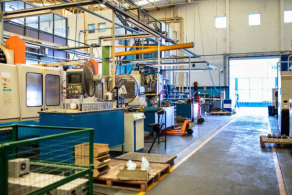As a vital component of the manufacturing industry, machine shops undertake the task of providing high-precision, high-quality parts processing for various sectors. With continuous technological advancements and the diversification of industrial demands, the business scope and processing capabilities of machine shops have expanded significantly. This article provides a detailed introduction to the main business areas of machine shops, including common machining technologies, the types of services they offer, and the advantages of their processing capabilities. Whether in traditional mechanical machining or modern digital machining technologies, machine shops can meet the needs of clients across different industries, driving efficient production in various fields.
- Main Business Areas of Machine Shops
The business scope of machine shops is extensive, primarily covering the following areas:
Precision Machining
Precision machining is one of the core services of machine shops, involving high-precision cutting, grinding, drilling, and other operations on various metal and non-metal materials. This type of machining is typically applied to components requiring high precision and superior surface quality, such as those in the aerospace, automotive, and electronics industries. By utilizing high-precision CNC machine tools and automated equipment, machine shops can ensure dimensional accuracy while improving production efficiency.
Casting and Forging Processing
Casting and forging are essential services provided by machine shops. Casting involves heating metal materials to a liquid state, pouring them into molds, and cooling them to form solid parts—ideal for producing large, complex-shaped components. Forging, on the other hand, involves heating metal materials and shaping them under mechanical pressure to produce high-strength, durable parts. These technologies are widely used in industries such as automotive, machinery, and shipbuilding.
Cutting Machining
Cutting machining is one of the most common methods in machine shops, including turning, milling, grinding, and drilling. These processes precisely remove excess material to create components that meet specifications. Turning is typically used for cylindrical objects, milling for flat and complex curved surfaces, grinding for improving surface quality, and drilling for creating holes.
Welding and Assembly
Welding is a process that joins metal materials through heating or pressure. It plays a crucial role in machining, particularly in manufacturing large structural components or applications requiring high-strength connections. Welding technology is used to fabricate metal structures, mechanical fittings, and more. Assembly involves putting together multiple processed parts according to design specifications to form the final product.
Heat Treatment Processing
Heat treatment alters the internal structure of metal materials through heating and cooling processes to enhance mechanical properties such as hardness and strength. Common heat treatment methods include quenching, annealing, and tempering. Machine shops often provide heat treatment services, especially in the production of high-hardness or high-wear-resistant components like molds and automotive engine parts.
- Processing Capabilities of Machine Shops
The processing capabilities of machine shops encompass multiple aspects, including equipment technology, machining precision, production scale, and adaptability to different materials. Below are the key characteristics of machine shops’ processing capabilities:
High-Precision Machining Capabilities
As manufacturing quality requirements continue to rise, machine shops increasingly focus on enhancing high-precision machining capabilities. Modern machine shops are typically equipped with CNC machine tools, laser cutters, CNC milling machines, and other advanced equipment, enabling micron-level precision to meet the stringent demands of industries such as aerospace, medical, and electronics. Additionally, with advanced measuring instruments, machine shops can conduct precise quality inspections to ensure products meet high standards.
Large-Scale Production Capacity
While maintaining high precision, many machine shops also possess large-scale production capabilities. By adopting efficient automated production lines and digital control systems, machine shops can achieve mass production while ensuring consistency and quality stability across batches. This is particularly crucial for industries requiring standardized parts in large quantities, such as automotive and home appliances.
Material Processing Versatility
The processing capabilities of machine shops are not only reflected in technology and equipment but also in their adaptability to different materials. Modern machine shops can process various metals, including aluminum, copper, stainless steel, alloy steel, and titanium. Some also handle non-metal materials such as plastics and ceramics. With the emergence of new materials, many machine shops now offer processing services for high-performance and specialty materials (e.g., high-temperature alloys, composites) to meet the needs of aerospace, defense, and other industries.
Complex Component Machining Capabilities
With technological advancements and industrial development, an increasing number of components feature complex structures and require higher precision and consistency. Through precision machining, 3D measurement, and automated control, machine shops can effectively tackle the challenges of complex part manufacturing. Whether for molds with intricate geometries or components requiring precise bore and diameter fits, machine shops can complete these tasks using advanced equipment.
- Advantages and Application Fields of Machine Shops
Machine shops are widely used across various industries, particularly excelling in the production of high-precision and complex components. Key application areas include:
Automotive Industry
In the automotive sector, machine shops specialize in precision machining of engine components, transmission systems, and body structural parts. Given the high precision and reliability requirements of automotive parts, machine shops’ high-precision machining and mass production capabilities make them indispensable to automotive manufacturing.
Aerospace Industry
The aerospace industry demands components with exceptional precision, strength, and durability. Machine shops in this field primarily focus on processing engine parts, structural components, and fuselage elements—especially those made of complex, thin-walled, or high-temperature-resistant metals. Their precision machining capabilities are critical in this sector.
Medical Equipment Industry
The medical device industry requires products to be highly precise, reliable, and defect-free. Machine shops provide high-precision part processing services to ensure the safety and stability of medical equipment during use.
- Conclusion
With the continuous development of industrial technology, machine shops play an increasingly vital role in manufacturing. From traditional mechanical machining to modern CNC machining, machine shops have made breakthroughs in precision, production scale, material adaptability, and automation. By offering diverse processing services, they meet the demand for high-precision, high-quality components in aerospace, automotive, medical, and other industries. In the future, machine shops will leverage their technological advantages in broader fields, providing robust support for the global manufacturing industry’s growth.

